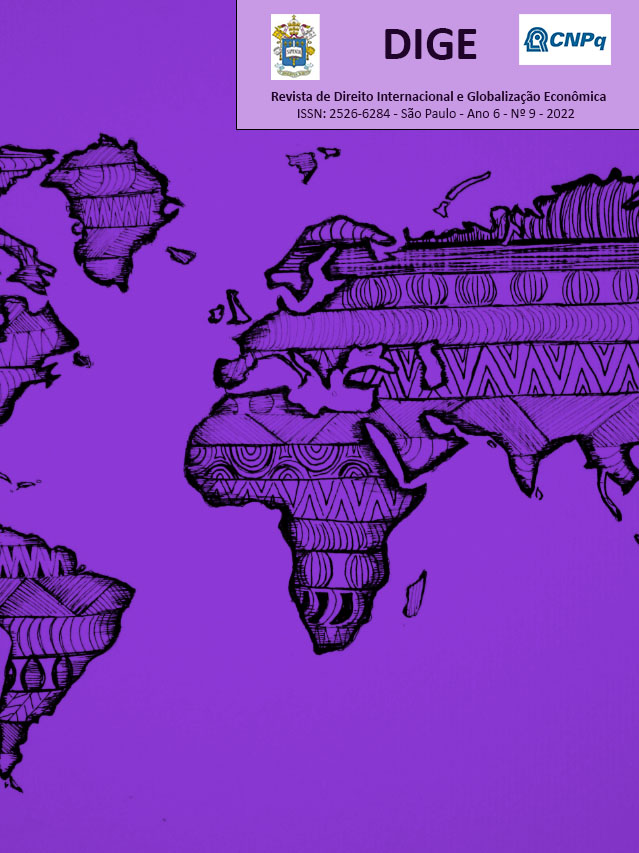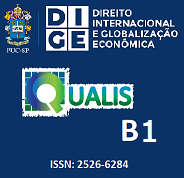A view of the brazilian foreign exchange regulation in the perspective of international trade law
– where do we come from and where are we going to?
DOI:
https://doi.org/10.23925/2526-6284/2022.v9n9.59486Keywords:
Foreign Exchange, Foreign Exchange Agreement, Currency, Rigidity and flexibilization, International Trade LawAbstract
This article lends itself to analyzing the problem of Brazilian foreign exchange regulation with a view from the perspective of international trade law. The analysis of the theme acquired relevance in face of the centenary legislative framework that could no longer subsist without updating. The enactment of Law 14,286/2021 – also called the new foreign exchange statute – is the most recent step in the national foreign exchange rate policy with a view to better alignment with the international scenario. Coming at a good time – in times of virtual, online and (almost) instantaneous relationships, which seem to be increasingly accelerated – it is expected that it can contribute to the development of commercial relations on the international scene, providing the country with better scope for the globalization process in today's data and information society. The complexity and multiplicity of possible interrelationships, especially when dealing with law and economics, foreign exchange and international trade, justifies the present study, in the sense of identifying some of the novelties brought by the new legislation that, it is hoped, will facilitate the process of (re)insertion of the country into the agile cross-border commercial scenario. In this sense, this article revisits some important concepts about currency and foreign exchange; covers, albeit in a panoramic way, some milestones in the secular history of the foreign exchange, in order to demonstrate how the main legal concepts referring to this tool were born and forged in the heart of international trade; and addresses, throughout the text, where the foreign exchange is comprised with, what are its points of contact and convergence with international trade law.
References
ARRAES, Maria Celina Berardinelli e SIQUEIRA, Geraldo Magela. Reformulação cambial: regulação versus conversibilidade e internacionalização do real. – Revista Brasileira de Comércio Exterior, n. 147, p. 36–47, 2021.
BAPTISTA, Luiz Olavo. Contratos Internacionais. – São Paulo: Lex Editora, 2010.
COELHO, Fabio Ulhoa. Biografia não autorizada do Direito. – 1.ed. – São Paulo: Editora WMF Martins Fontes, 2021.
___________________. Curso de direito comercial. – v.1 – 6.ed. – São Paulo: Saraiva, 2002.
___________________. Curso de direito comercial. – v.3 – 4.ed. – São Paulo: Saraiva, 2003.
___________________. Os livres podem ser iguais?: liberalismo e direito. – São Paulo: Editora WMF Martins Fontes, 2022.
COMPARATO, Fábio Konder. Contrato de câmbio. – Doutrinas Essenciais Obrigações e Contratos, v. 6, p. 1137–1149, 2011.
GAMA, Décio Xavier. Contrato de câmbio. Aspectos jurídico -processuais. – Revista da EMERJ, v.1, n.3, 1998. Disponível em: https://www.emerj.tjrj.jus.br/revistaemerj_online/edicoes/revista03/revista03.pdf. Acesso em: 23 jun. 2022.
GOLDSTEIN, Sergio Mychkis. Aspectos jurídicos da flexibilização cambial brasileira. – Revista de Direito Bancário e do Mercado de Capitais, v. 29, p. 96-108, 2005.
GUIMARÃES, Antônio Márcio da Cunha e GUIMARÃES, Arianna Stagni. in GUIMARÃES, Antônio Márcio da Cunha. Direito do comércio internacional: estudos em homenagem ao Prof. Dr. Geraldo José Guimarães da Silva. – São Paulo: Lex Editora, 2013.
GUIMARÃES, Antônio Márcio da Cunha e SILVA, Geraldo José Guimarães da. Manual de direito do comércio internacional – Contrato de câmbio. – São Paulo: Revista dos Tribunais, 1996.
PUGLIESI, Márcio. Filosofia e Direito: uma abordagem sistêmico-construcionista. Tomo 1:Tomo 2 – São Paulo: Aquariana, 2021.
RIZZARDO, Arnaldo. Contratos. – Rio de Janeiro: Forense, 2006.
ROSSI, Pedro. Institucionalidade do mercado de câmbio e a política cambial no Brasil. – Economia e Sociedade, Campinas, v. 23, n. 3 (52), p. 645-667, 2014. Disponível em https://periodicos.sbu.unicamp.br/ojs/index.php/ecos/article/view/8642129/9620. Acesso em: 23 jun. 2022.
SAVIGNY, Friedrich Carl von. Sistema de Direito Romano Atual – Vol. VIII. Trad. Ciro Mioranza – Ijuí: Ed. Unijui, 2004. – (Coleção clássicos do direito internacional).
SIQUEIRA, Geraldo Magela. Câmbio e capitais internacionais: o relacionamento Financeiro do Brasil com o exterior. – São Paulo: Aduaneiras, 2016.
THORTENSEN, Vera. OMC - Organização Mundial do Comércio: as regras do comércio internacional e a nova rodada de negociações multilaterais. (Coordenadora Yone Silva Pontes) – 2. ed. – São Paulo: Aduaneiras, 2001.
VERÇOSA, Haroldo Malheiros Duclerc. Obrigações em moeda estrangeira e o novo regime do câmbio no Brasil. – Migalhas. Disponível em: https://www.migalhas.com.br/depeso/357866/obrigacoes-em-moeda-estrangeira-e-o-novo-regime-do-cambio-no-brasil. Acesso em: 23 jun. 2022.




